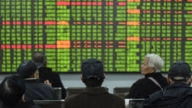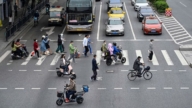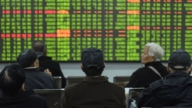【新唐人2015年01月13日訊】一些經濟專家最近對2015年的中國經濟進行預測,發現中國經濟問題的關鍵詞在於「風險」,體現在多個方面。有分析指出,中國經濟看似穩定,其實已經超過臨界點,所有致命的因素都在加劇。
《彭博新聞社》在去年的12月18號指出,中國經濟若想維持7%的增長,中共當局必須關注六大方面:信貸緊鎖、房地產下滑、外部衝擊、政策失誤、地方政府債務危機,以及美國利率上升。
美國諮商會駐北京經濟學家Andrew Polk向《彭博新聞社》表示,信貸緊縮的三個可能催化劑是:影子銀行發生大面積違約;三個月內房價暴跌10%;美聯儲加息引發資本外流,導致銀行流動性降低。
北大金融學教授Michael Pettis表示,外部衝擊可能來自歐洲或其他地方,將導致中國企業減少投資。如果再加上壞賬的延期付款,可能影響新增信貸的增長,使其不足以支持經濟增長。
1月9號,英國《金融時報》中文網財經專欄作家徐瑾指出,2015年中國經濟的風險主要體現在五個方面。首先在於國際環境動盪,強勢美元伴隨著資本回流美國,如果此時此刻美聯儲加息,將導致中國的資本外逃。此外,在經濟下行的情況下,隨著土地出讓金收入減少,地方政府收入增長將只有2.2%左右。今年即使翻倍發債,也不足以應付地方債務還本付息需求。
美國南卡羅萊納大學艾肯商學院教授謝田:「我覺得最危險的是銀行壞帳,尤其是跟房地產相關這個部位的壞帳,他們可能會因為房地產泡沫的破滅而引發,這個可能是最大的危險。地方債務的問題是另一個危險,還一個就是,如果世界經濟進一步下滑,中國製造業進一步萎縮,有更多的企業倒閉,引發失業浪潮的話,這個對中共也是一個大的危險。」
美國南卡羅萊納大學艾肯商學院教授謝田指出,中國經濟已經處在一種超臨界的狀態。
謝田:「它實際上已經過了臨界點,應該爆破了,但是它還沒有,看來穩定的狀態,但是所有那些致命的因素都在加劇。我們提到最主要的問題,房地產泡沫和地方債的問題和失業率的問題,這三點可能會由外界其他因素來誘發。比方說美聯儲突然升息,導致美元回流,這可能是一個衝擊的因素。這些看起來小小的問題,在中國經濟超臨界的狀態下,都可能成為引發經濟崩潰的根源。」
北京科技大學東凌經濟管理學院教授何維達撰文指出,2015年,製造業、採礦業、電力、運輸等,受國外經濟復甦緩慢、國內產能過剩影響,持續下滑的趨勢難以根本改善。此外,房地產量價齊跌,購房者可能因此撤離,導致價格進一步下跌。
何維達還指出,地級市、縣(市)、鎮三級地方政府,存在大規模舉債建設「新區」或各類「園區」的同時,地方融資平臺的債務總量也在不斷纍加,加上缺乏有效監控,出現地方債務危機的可能性增大。
浙江財經大學經濟與國際貿易學院教授謝作詩:「地方債務和影子銀行這一塊,是比較嚴重的。中國經濟確實各方面出現了問題,泡沫化去槓桿的過程中是有問題,但我不認為05年經濟,就是這些問題爆發出來,就引起經濟崩盤。政府手上還有很多空間,救市啊,雖然我們知道長期救不了市,但是短期可以稍微拖一拖。」
北京國情內參首席研究員鞏勝利認為,2015年中國最大的麻煩是貨幣問題。
鞏勝利:「按國民生產總值產出來說,中國的貨幣投放已經是佔了全球的一半以上了。但是,(上)星期五中國政府公布了一個數據,中國的通縮已經到來。發了大量的貨幣,卻在緊縮,這是一個前所未有的難題。(上)星期五國家發改委投資司的司長講了,中國今年計劃是7萬億的大投入,這樣下去後,貨幣情況不知道是甚麼樣,這樣一分析,可能貨幣的問題比其他問題都要嚴峻的多。」
《彭博新聞社》1月8號的報導披露,中共國務院去年底批准的七大類基礎設施項目,總投資額逾10萬億元人民幣,其中今年投資超過7萬億元。
而在2008年金融危機後,中共當局出臺4萬億元的經濟刺激計劃,造成多個行業產能過剩,也導致了從2010年開始的房價飛漲。大陸知名經濟學家吳敬璉曾痛批,每當宏觀經濟出現問題,中共總是動員海量資源投入去救市,這是飲鴆止渴的辦法,將使宏觀經濟狀況變得越來越脆弱。
採訪/易如 編輯/陳潔 後製/陳建銘
“Risk" is Khe Key Word For China’s Economy in 2015,
Say Scholars.
“Risk" has become the key word in recent predictions
about China’s economic prospective in 2015.
Scholars say people will see risks in many aspects
of China’s economy.
Although appearing to be stable, China’s economy has
virtually exceeded its critical point.
All risk factors will only worsen in the upcoming year.
A Bloomberg report on Dec.18 2014 said, “to ensure China
achieves growth of about 7 percent next year", the Chinese
Communist Party (CCP) must watch on the following aspects:
Credit crunch, home buyers strike, external shock;
Policy miscalculation, local government debt shakeout; and
rising U.S. interest rates.
The Conference Board’s Beijing-based economist, Andrew
Polk, told Bloomberg “three catalysts may potentially disrupt
the supply of credit".
They are: “a large default in the shadow banking sector “;
“a 10 percent plunge in property prices within three months";
And “a contraction in bank liquidity due to capital outflows
in the face of tightening by the Federal Reserve".
Michael Pettis, a finance professor at Peking University, said
an external shock may come from Europe or elsewhere and
lead to disinvestment of China’s businesses.
A large need to rollover bad loans may also prevent “China
from generating enough new credit to maintain growth rates".
On Jan.9, The FT Chinese columnist Xu Jin published an article
that China’s economic risks will be observed in five aspects.
First of all, the turbulent international situation will
encourage return of investment in dollars to the U.S..
If the Federal Reserve raises its interest rate at the moment,
China will probably see mass capital flight.
Another factor is plummeting land sales
due to economic slowdown.
Xu estimates that the revenue of local CCP governments
may only increase by 2.2% in 2015.
This means, even doubling bonds issuance will not be able
to afford the interest rates on local government debts.
Prof. Xie Tian, Aiken Business School, Univ. of S. Carolina,
“I think the biggest danger lies in bad debts of banks,
especially those linked to the real estate industry.
These kinds of bad debts may balloon if the housing bubble
bursts. This can be the most dangerous scenario.
Risks also result from local debt problems or global
economic decline.
The latter may lead to further shrinkage of
China’s manufacturing industry.
If more companies are shut down and more people lose their
jobs, it is also a huge challenge for the CCP’s regime to survive."
Xie Tian also commented that, China’s economy has
already exceeded its critical point.
Xie Tian,"Indeed China’s economy already exceeds its
critical point and should have collapsed.
But somehow it still appears to be stable.
Even though, all those critical problems are still
becoming worse.
We just mentioned three biggest problems, housing bubble,
local government debts and rising unemployment rates.
These problems may increase due to external factors.
For example, if the Federal Reserve raises its interest rate,
dollars will return to the U.S. and China’s economy can be
shaken by this.
It may seem trivial, but they could be the fuse of economic
breakdown as China’s economy exceeds its critical point."
Prof. He Weida, Dongling School of Economics and
Management, USTB, said China’s manufacturing, mining,
power and transportation industry could continue to slide
in a slow global economic recovery and domestic overcapacity.
Falling quantities and prices will lead to house buyer strikes,
causeing house prices to drop further, said He.
He Weida also commented that, local municipal, county and
township governments had conducted massive construction
of “new residency communities" though bank borrowing.
The overall scale of local debts keeps increasing, without any
effective control or management.
He said, this greatly increased the risk of local debt crisis.
Prof. Xie Zuoshi, Zhejiang University of Finance & Economics,
“Local debt and shadow bank problems are pretty bad now.
China’s economy is truly seeing problems in many aspects,
such as in leveraging process.
However, I don’t think China’s economy will collapse in 2015.
The government still has some space to rescue the market
or do something else.
We all know that this will not work in the long term,
but it can relieve the pain in the short-term."
Gong Shengli, Chief Researcher of Guoqing Neican Journal,
believes that the biggest problems of China’s economy
in 2015 are monetary ones.
Gong Shengli, “If weighed by GDP, the CCP already has more
than half of the world’s monetary base.
However, last Friday the CCP officially announced deflation
in China’s economy.
Overprinting money and in the meantime deflation?
This is a puzzle that we have never seen.
Investment director of National Development and Reform
Commission said 7 trillion Yuan will be spent this year.
Nobody knows what the monetary situation will become
after this.
Maybe monetary issues are even worse than
other economic problems for the CCP."
A Bloomberg report on Jan.8 said, the CCP’s State Council
approved a 10-trillion Yuan plan for infrastructure projects
in seven key areas last year.
About 7 trillion Yuan ($1.1 trillion) will be spent in 2015.
The CCP released a 4-trillion Yuan stimulus plan in response
to the global financial crisis in 2008.
This has led to overcapacity in many industries and
the following house price surge since 2010.
Renowned Chinese economist Wu Jinglian seriously
criticized such a strategy.
Wu said the CCP always used numerous resources to rescue
the market when there were problems in macroeconomics;
Such moves only give temporary relief but ultimately create
an extremely delicate macroeconomics situation in China.
Interview/YiRu Edit/ChenJie Post-Production/Chen Jianming


























